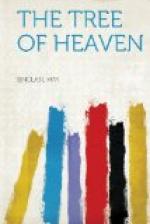“Do you think I’m bound by that—now?”
“Now? You’re more bound than ever, because he’s more near you, more alive.”
“You wouldn’t say that if you loved him.”
* * * * *
One day a package came to her from Eltham. Two notes were enclosed with it, one from Drayton’s mother and one from Drayton:
“Frank said I was to send you this if he was killed. I think he must have known that he would not come back.”
* * * * *
“My Dear Dorothy,—You will think this is a very singular bequest. But I want you to see that my memory is fairly good.”
* * * * *
The very singular bequest was a Bible, with three cigarette-lighters for markers, and a date on the fly-leaf: “July 5th, 1912.”
The cigarette-lighters referred her to Psalm cxliv., and Isaiah xxxv. and xl., and pencil marks to the verses:
“Blessed be the Lord my strength which teacheth my hands to war and my fingers to fight."...
“And an highway shall be there ... the redeemed shall walk there, and the ransomed of the Lord shall return” ...
... “They that wait upon the Lord shall renew their strength; they shall mount up with wings as eagles; they shall run and not be weary; they shall walk and not faint.”
And their last hour came back to her with its mysterious, sweet and powerful passion that had no fear in it; and she laid hold again on the Reality they had seen and felt together.
The moment passed. She wanted it to come back, for as long as it lasted she was at peace.
But it did not come back. Nothing came back but her anguish of remorse for all that she had wasted.
XXI
After Drayton’s death Frances and Anthony were sobered and had ceased to feed on illusions. The Battle of the Marne was fought in vain for them. They did not believe that it had saved Paris.
Then came the fall of Antwerp and the Great Retreat. There was no more Belgium. The fall of Paris and the taking of Calais were only a question of time, of perhaps a very little time. Then there would be no more France. They were face to face with the further possibility of there being no more England.
In those months of September and October Anthony and Frances were changed utterly to themselves and to each other. If, before the War, Frances had been asked whether she loved England, she would, after careful consideration, have replied truthfully, “I like England. But I dislike the English people. They are narrow and hypocritical and conceited. They are snobbish; and I hate snobs.” At the time of the Boer War, beyond thinking that the British ought to win, and that they would win, and feeling a little spurt as of personal satisfaction when they did win, she had had no consciousness of




